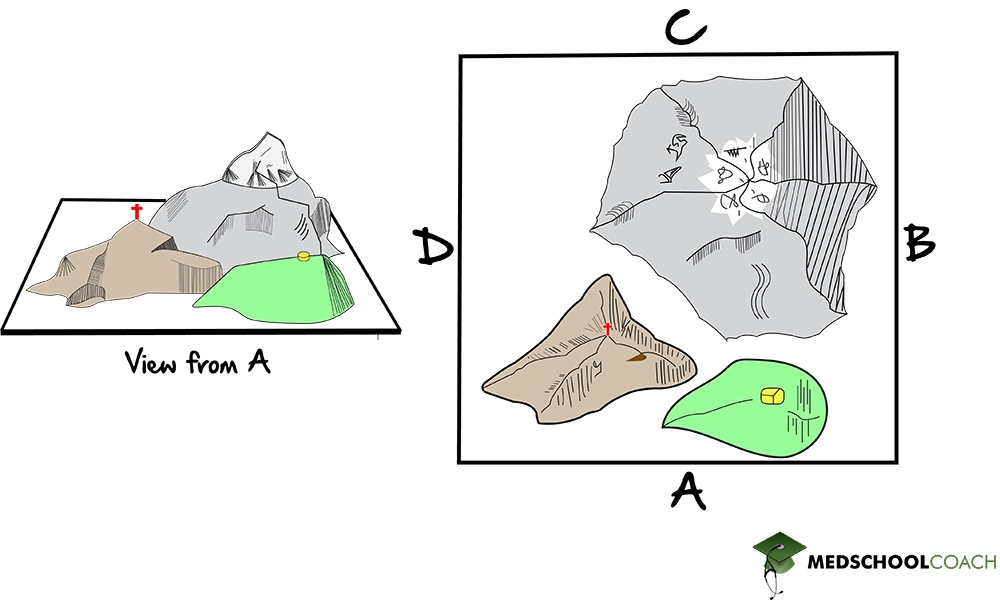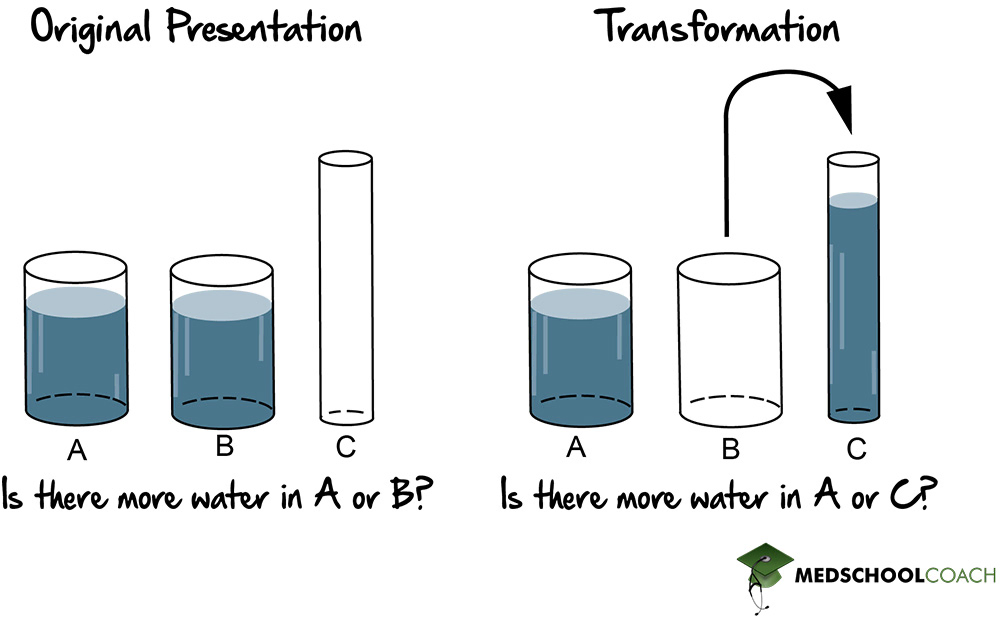Piaget's Stages of Cognitive Development
MCAT Psychology - Chapter 2- Section 2 - Cognition - Cognitive Development
- Home
- »
- MCAT Masterclass
- »
- Psychological, Social, and Biological Foundations of Behavior
- »
- Psychology
- »
- Cognition
- »
- Cognitive Development
- »
- Piaget’s Stages of Cognitive Development – MCAT Psychology
Sample MCAT Question - Piaget's Stages of Cognitive Development
In which stage of Piaget’s theory of cognitive development does stranger anxiety develop?
a) Concrete Operational
b) Formal Operational
c) Sensorimotor
d) Pre-operational
C is correct.
Stranger anxiety, as well as object permanence, develop during the sensorimotor stage of Piaget's theory of cognitive development. Answer choice A is incorrect because an understanding of conservation and transformations develop during the concrete operational stage, not stranger anxiety. Answer choice B is incorrect because abstract logic thinking develops during the formal operational stage, not stranger anxiety Answer D is incorrect because pretend play, language development, and egocentrism develop during the preoperational stage, not stranger anxiety.
Get 1-on-1 MCAT Tutoring From a Specialist
With MCAT tutoring from MedSchoolCoach, we are committed to help you prepare, excel, and optimize your ideal score on the MCAT exam.
For each student we work with, we learn about their learning style, content knowledge, and goals. We match them with the most suitable tutor and conduct online sessions that make them feel as if they are in the classroom. Each session is recorded, plus with access to whiteboard notes. We focus on high-yield topics if you’re pressed for time. If you have more time or high-score goals, we meticulously cover the entire MCAT syllabus.
Piaget's Stages of Cognitive Development for the MCAT
Cognitive development is the growth and maturation of thinking processes. These processes include reasoning, problem-solving, perceiving, remembering, and imagining. Jean Piaget is the most famous psychologist that has studied cognitive development in children. He believed that children go through four stages of cognitive development, each of which are important to know for the MCAT.
The first of Piaget’s stages is the sensorimotor stage, which takes place from the ages of zero to two. There are two important developmental phenomena in this stage: object permanence and stranger anxiety.
The second stage is the preoperational stage, which occurs between the ages of two to seven. Children at this stage participate in pretend play, their language develops rapidly, and they exhibit egocentrism. This stage is called preoperational because it occurs before children have mastered operations and certain reasoning skills.
The third stage is the concrete operational stage, which takes place from the ages of seven to 11. Unlike children in the preoperational stage, children in the concrete operational stage have mastered conservation and transformations but can only understand concrete knowledge.
The last stage is the formal operational stage, which occurs from the age of 11 and up. In this stage, children are capable of understanding abstract logic and hypothetical situations, not just concrete knowledge.
Let’s go into each of these four stages in more detail.
Stage 1: The Sensorimotor Stage
Piaget’s first stage is called the sensorimotor stage because children in this stage are learning about the world using sensory input and motor behavior. For example, children will grab and shake a rattle to learn that the rattle produces a sound.
The first important developmental phenomenon in the sensorimotor stage is object permanence, which is the idea that children know an object is present even if they can’t perceive it. One of the most common ways to test object permanence is to place a toy in front of an infant and cover it with a blanket. If an infant has not developed object permanence, when the toy is covered, they will think that the toy has disappeared and will not reach for it. However, if the infant reaches for the toy under the blanket, they have developed object permanence because they understand that the toy is still there. An infant’s response to this test can discern whether or not they have developed object permanence.
Another phenomenon that occurs in this stage is stranger anxiety, which is when a baby exhibits distress and fear upon encountering a stranger. This is because they can’t assimilate strangers’ faces into any of their existing schemas of familiar faces. Since the stranger’s face doesn’t match any familiar faces, the infant doesn’t know what their experience with the stranger will be like, creating feelings of fear and distress. While children in the sensorimotor stage can understand object permanence, they are not yet capable of understanding conservation and transformations, which develops during the preoperational stage.
Stage 2: The Preoperational Stage
The second stage of Piaget’s stages of cognitive development is the preoperational stage, which occurs during the ages of two to seven. During this stage, children learn to think using symbols, but their thinking can be illogical. Pretend play is one way children use symbols in this stage and examples include sword fighting with sticks and pretending to drink out of an empty cup. In these examples, sticks are used as symbols for swords and an empty cup is used as a symbol for a beverage. Another important development during this stage is the rapid development of language. Although children in this stage can understand and speak a language, this doesn’t mean that they have the same level of reasoning and logic as adults.
One developmental phenomenon of this stage is egocentrism, which is when children fail to consider perspectives other than their own. They believe that others perceive a situation in the same way that they perceive a situation. For example, a boy displaying egocentrism may think that a toy car would be a good gift for his sister because he would like the toy himself. He fails to consider that his sister might have different interests than himself. Another example of egocentrism is seen with the Three Mountain Task depicted in Figure 1.
This task is a famous experiment that Piaget developed, where a child is placed in front of a setup with three mountains on a table. Depending on where the child is placed, he will see the mountains from a particular perspective. The child is then asked, “what would someone else see if they were standing at a different position?” The child is egocentric if they always say that other people, regardless of their position around the table, will see the same things as he does.

Stage 3. Concrete Operational Stage
The third stage of Piaget’s stages of cognitive development is the concrete operational stage, which ranges from the age of seven to 11. During this stage, children are capable of thinking logically about concrete, or real, events but aren’t able to understand abstract logic. This logical reasoning includes the understanding of conservation and transformations, which is a concept that children in the preoperational stage do not understand.
An example of conservation is the conservation of liquids, which is demonstrated in an experiment depicted in Figure 2. A child is presented with two glasses that are the same shape and hold the same amount of water. When asked how the amount of water in these two glasses compare, children in both the preoperational and concrete operational stages are able to say that both glasses hold the same amount of liquid. The child is then presented with a third glass that is narrower with a smaller diameter. The liquid from one of the original two glasses is poured into this narrower glass, and due to its smaller diameter, the liquid will rise up to a higher level. When asked how the amount of water in the glasses compare, children in the preoperational stage will say that there is more liquid in the narrow glass than in the original glass because the liquid in the narrow glass is higher. However, children in the concrete operational stage recognize that the glasses hold the same amount of liquid, despite their differences in liquid height.

Another example of conservation is conservation of number, which is demonstrated in an experiment depicted in Figure 3. Initially, there are a number of coins spread out into two lines. The coins are spaced out evenly, and the experimenter asks the children if one of the lines has more coins than the other. Children in both the preoperational and concrete operational stages can say that both rows have the same number of coins. The experimenter then takes one of the two lines of coins and spreads the coins out. There is no change in the number of coins in this row, and the experimenter asks the children again if one of the lines has more coins than the other. Children in the preoperational stage will think this row now has more coins than the other row just because it is longer. However, children in the concrete operational stage recognize that there is no difference in the number of coins in the lines.

Stage 4. Formal Operational Stage
The last stage of Piaget’s stages of cognitive development is the formal operational stage, which is from the age of 11 and up. During this stage, children can think logically about both concrete events and hypothetical situations. In contrast to the children in the concrete operational stage that can only understand concrete events, children in the formal operational stage can understand abstract ideas.
To illustrate the difference between children in the concrete operational and formal operational stages, children are told that if a glass window is struck with a hammer, the glass window will break. Then, the children are asked what will happen to the window if it is stuck with a hammer. Children in both the concrete operational and formal operational stages will say that the window will break. Next, children are told that if a glass window is struck with a feather, the glass window will break. When the children are asked what will happen to the window if it is struck with a feather, children in the concrete operational stage will say that the window does not break. They are only capable of reasoning with concrete events, and to them, a feather is fluffy and incapable of breaking a glass window. However, children in the formal operational stage are capable of understanding hypothetical situations and abstract logic, so they can correctly respond that the window will break. This example shows that unlike children in the formal operational stage, children in the concrete operational stage can’t understand situations that don’t match their real-world understandings, such as a feather being capable of breaking a glass window. It is the ability to think abstractly and hypothetically that makes this final developmental stage unique.
Explore More MCAT Masterclass Chapters
Take a closer look at our entire MCAT Masterclass or explore our Biochemistry lessons below.

One-on-One Tutoring
Are you ready to take your MCAT performance to a whole new level? Work with our 99th-percentile MCAT tutors to boost your score by 12 points or more!
See if MCAT Tutoring can help me
Talk to our enrollment team about MCAT Tutoring

MCAT Go Audio Course
Engaging audio learning to take your MCAT learning on the go, any time, any where. You'll be on the way to a higher MCAT score no matter where you are. Listen to over 200+ lessons.

MCAT Practice Exams
Practice makes perfect! Our mock exams coupled with thorough explanations and in-depth analytics help students understand exactly where they stand.

MCAT Prep App
Access hundreds of MCAT videos to help you study and raise your exam score. Augment your learning with expert-created flashcards and a question banks.